Last month, San Francisco followed in the footsteps of Berkeley, Los Angeles, Philadelphia, and the State of Virginia by overhauling its traffic enforcement rules to deprioritize minor traffic stops that are often used as an excuse for searching cars — stops that disproportionately impact Black and Latinx drivers and strip wealth from lower-income communities across the city while having no effect on road safety and little effect on public safety. These stops are of particular concern to SPUR because disparities in enforcement and the high cost of fines and fees make traffic enforcement reform an important part of achieving economic justice.
After a year-long community and expert engagement process, the San Francisco Police Commission ended the use of these so-called pretext stops and deprioritized eight minor traffic offenses such as broken tail lights and incorrectly displayed license plates. The commission identified these offenses on the basis of traffic stop data that included demographic information on the person pulled over, the purpose of the stop, and the result of the stop — for example, a citation, an arrest, or the seizure of guns or illegal drugs. It also used data from the City and County of San Francisco and the Vision Zero Network. The Vision Zero data show that the deprioritized offenses were not the primary collision factor in accidents dating as far back as 2014. The commission specifically did not limit enforcement of violations that contributed to road safety, and it emphasized that police can still make stops for the deprioritized traffic offenses when they reasonably suspect that the driver was involved in a crime other than the minor traffic violation.
SPUR is proud to be on the steering committee for the Coalition to End Biased Stops, which advocated in support of ending pretext stops in San Francisco. Fellow steering committee members include the GLIDE Foundation; the San Francisco Bicycle Coalition; Walk San Francisco; the ACLU of Northern California; the San Francisco Public Defender’s Office; the Council on American-Islamic Relations, the San Francisco Bay Area office; and the Lawyers’ Committee for Civil Rights of the San Francisco Bay Area. Our 110-member coalition brings together impacted people, road safety advocates, economic justice advocates, researchers, and others to champion the best policies to keep roads and communities safe without financially punishing lower-income communities for minor offenses such as a broken rearview mirror.
Traffic Stops Disproportionately Impact Black and Latinx Drivers
Stopping people from driving in ways that endanger others is essential to road safety and building better cities. However, California’s traffic laws go far beyond road safety and venture into equipment and other non-moving violations that often have more to do with a person’s income than their driving behavior. These traffic stops provide little to no safety benefits and have a deep and disproportionate economic impact on Black and Latino people across California.
Black and Latinx drivers are disproportionately stopped by police for traffic infractions in California. San Francisco is no exception. Our research project The High Cost of Traffic Stops found that in 2019, Black drivers made up 19% of all traffic stops, but Black residents were just 5% of the city’s population. Latinx drivers made up another 19% of traffic stops, but Latinx residents are only 15% of the city’s population.
Black and Latinx drivers are disproportionately stopped by police in San Francisco.
Traffic Stops by Race and Ethnicity, San Francisco, 2019
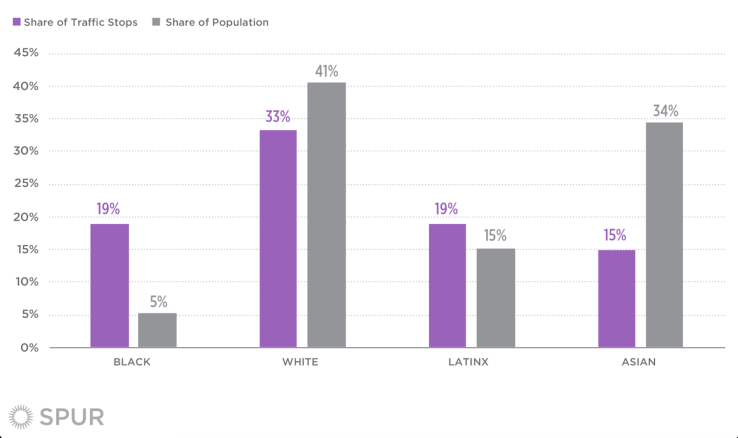
Pretext Stops Drive Much of the Racial Disparity in Traffic Enforcement
Black and Latinx drivers are more likely than drivers of other races and ethnicities to be pulled over for equipment or non-moving violations, such as an incorrectly attached license plate, a broken tail light, or lack of car registration in the vehicle. These kinds of violations have nothing to do with road safety, and they divert resources away from the pursuit of real road safety. Many of these stops are pretext stops, which help drive the racial disparities in traffic enforcement in San Francisco.
Black and Latinx drivers are more likely than their neighbors to be stopped for equipment or nonmoving violations, like having a tail light out or not having their registration.
Reasons for Traffic Stops by Race and Ethnicity, San Francisco, 2019
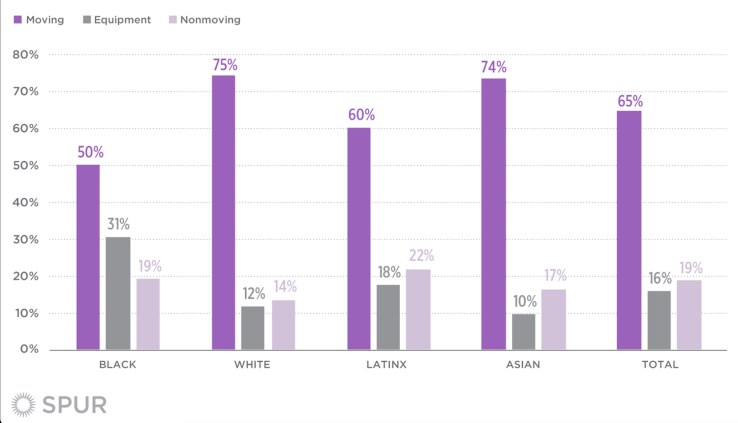
Many pretext stops result in no action by the officer making the stops. A majority of Black people pulled over by police for traffic infractions are released without receiving a citation, indicating that the stops are for reasons other than correcting driver behavior. White and Asian drivers, who are much more likely to get pulled over for dangerous driving behavior such as running a red light, were the groups most likely to receive a traffic citation during a traffic stop.
Black drivers are less likely to receive a citation than any other group.
Result of Traffic Stop by Race and Ethnicity, San Francisco, 2019
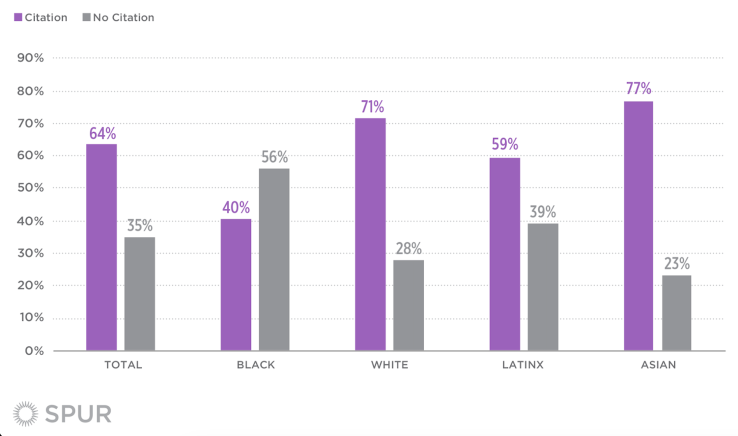
Despite Black drivers being less likely than any other racial or ethnic group to receive a traffic citation, they are more ticketed than any other group in the city because of the disproportionate number of stops they experience. Per capita, Black people are ticketed at a rate three times higher than their white neighbors. A Black driver in San Francisco is much more likely to have received a ticket than a white driver.
Black drivers are ticketed at a rate nearly three times higher than any other group.
Per Capita Citation Rate by Race and Ethnicity, San Francisco, 2019
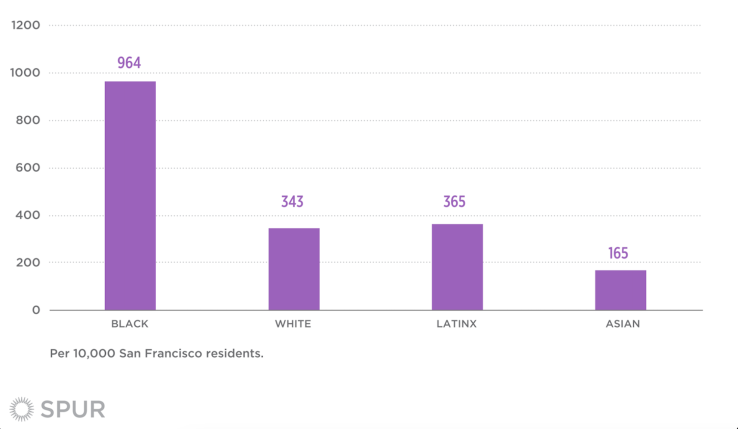
License Plate-Related Stops Illustrate Disproportionate Harms and Lack of Public Safety Benefits
Black and Latinx drivers are disproportionately pulled over for seven of the eight traffic offenses deprioritized by the Police Commission. In San Francisco, an incorrectly displayed license plate is the most common traffic stop for Black drivers. In 2019, just 22% of Black drivers pulled over for this offense actually received a traffic citation, compared with 45% of white drivers and 58% of Asian drivers. These citation disparities are evidence that the stops have little to do with correcting the driver behavior of Black drivers.
Despite the relatively small share of Black and Latinx drivers ticketed for incorrectly displayed license plates, Black people are disproportionately fined for the offense. An analysis of license plate-related stops showed that Black drivers are nearly nine times as likely as white drivers to be given a ticket for an incorrectly displayed plate.
Black and Latinx drivers are most likely to be stopped by police for displaying license plates incorrectly or for a local ordinance violation. White and Asian drivers are most likely to be stopped for failing to stop at a crosswalk or a stop sign.
Most Common Reasons for Traffic Stop by Race and Ethnicity, San Francisco, 2019
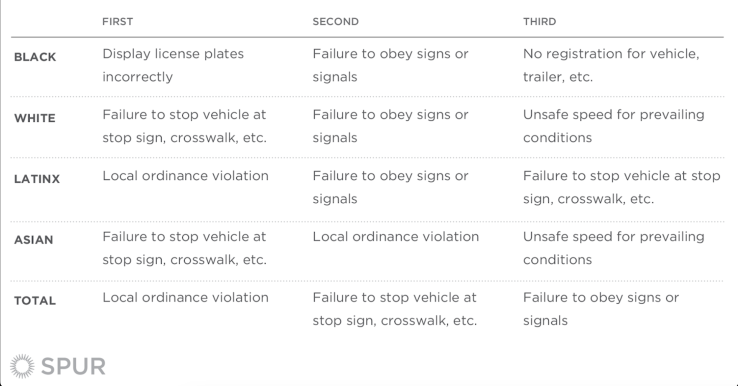
Black drivers represent 46% of stops for incorrectly displayed license plates but only 5% of the San Francisco population.
Share of Stops for Incorrectly Displayed License Plates and Share of Population by Race and Ethnicity, San Francisco, 2019

Only 22% of Black drivers stopped for an incorrectly displayed license plate actually receive a citation.
Share of Stops for Incorrectly Displayed License Plates That Resulted in a Citation by Race and Ethnicity, San Francisco, 2019

Among the more than 4,000 traffic stops in 2019 for incorrectly displayed license plates, 6% resulted in the recovery of contraband and less than 1% resulted in recovery of a gun. Only 1% of these stops resulted in an arrest of the driver. The vast majority of the stops provided no measurable public safety benefit. In fact, none of the types of stops that have since been deprioritized by the Police Commission affected public safety. The kinds of stops that did result in significant public safety benefits were in no way limited by the commission’s decision.
What California Can Do About Harmful Traffic Stops
The Police Commission decision to limit pretext stops is ultimately a short-term solution to reduce the harm of traffic stops. In a process known as “meet and confer,” the San Francisco police officer’s union can comment on, and possibly make changes to, elements of that decision. Additionally, future commissions could overhaul or unilaterally undo it. A long-term solution is necessary to make lasting change, but it will require changes in California’s laws and structural changes in traffic enforcement. Experts, police, and impacted people have discussed alternatives to the current system, including the following traffic enforcement reforms:
Change all non-moving violations to citation by mail. The legislature could make all non-moving traffic violations subject to a citation by mail – no traffic stop would occur, and officers would instead send a ticket by mail to the registered address of the vehicle owner. Across California, people of color are disproportionately stopped for non-moving violations. With a citation-by-mail system, those stops would no longer occur.
Remove some traffic violations from the purview of law enforcement. Making some traffic violations enforceable only by non-police officers is one way to give cities the opportunity to improve traffic enforcement outcomes. Berkeley and other cities have explored forming new traffic enforcement agencies to do just that. The agencies would end the practice of pretext stops for minor traffic offenses and open the door to developing more equitable solutions for equipment and other non-moving violations.
Reduce and eliminate fines and fees for minor traffic violations. Minor traffic violations, particularly equipment violations, are all too often punishments for being poor. Reducing and eliminating the fines and fees that help make California among the most expensive places in the United States to receive a traffic ticket could help remove much of the economic harm caused by pretext stops.
Eliminate many minor traffic violations from the vehicle code. Simplifying the vehicle code to focus on driver behavior that endangers others is one of the easiest ways to reduce the harm of traffic enforcement and end the practice of pretext stops. Removing minor traffic violations that have no impact on road safety from the vehicle code would free up resources for road safety efforts while also helping reduce racial disparities in traffic enforcement.
Next Steps in Traffic Enforcement and Economic Justice
The San Francisco Police Commission’s decision to limit stops for eight minor traffic offenses is just the first step in reducing the harm caused by traffic citations in California. It has not gone into effect yet and could change considerably as a result of negotiation with the police officers' union. More ambitious solutions are necessary to ensure the elimination of racial bias in traffic enforcement and the severe economic consequences of fines and fees. As a member of the Coalition to End Biased Stops, SPUR will be advocating for policies that keep our region’s roads safe without traffic enforcement that unfairly targets Black and Latinx drivers.
